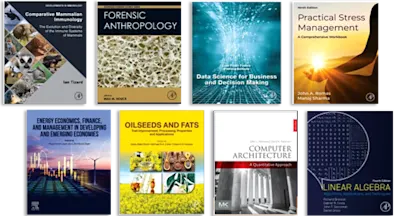
Water Use Efficiency, Sustainability and The Circular Economy
- 1st Edition - July 1, 2025
- Imprint: Elsevier
- Editors: Suhaib A. Bandh, Fayaz A. Malla, Anthony Halog
- Language: English
- Paperback ISBN:9 7 8 - 0 - 4 4 3 - 2 6 7 4 9 - 9
- eBook ISBN:9 7 8 - 0 - 4 4 3 - 2 6 7 5 0 - 5
Water Use Efficiency, Sustainability, and The Circular Economy is a comprehensive guide on water resource management in the context of a circular economy. The book covers a wide s… Read more
Purchase options

Lastly, the book contains innovative approaches like blockchain technology for water management and the circular economy perspective on wastewater resource management for energy recovery to help students, scholars, and policymakers navigate the complexities around water resource management.
- Covers a wide range of topics, from water reuse and recycling to water footprint tools
- Includes case studies and real-world examples to help researchers understand how circular economy principles can be applied to drive sustainability and efficiency in water-related practices
- Offers insights into innovative approaches like blockchain technology for water management and the circular economy perspective on wastewater resource management for energy recovery
2. Life cycle assessment of grey and black water management within circular economy
3. Circular economy in basic water supply networking
4. Circular economy in water management as a driver to sustainable businesses
5. Circular Economy in urban water sector: Challenges and opportunities
6. Water use efficiency in agriculture and circular economy
7. Industrial and commercial water use efficiency and circular economy
8. Domestic water use efficiency and Circular Economy
9. Water Cycle and Circular Economy: An Assessment Framework for Water Systems
10. Circular Economy approach to reduce water–energy–food nexus
11. Blockchain for Water management and Circular Economy
12. Wastewater resources management for energy recovery: The circular economy perspective
13. Integrating Virtual water trade and Circular Economy Mehdi Khoury Centre for Water Systems
14. Circular economy and water footprint: tools for effective water cycle management
15. Cradle-to-cradle analysis of water with circular economy perspective
16. Wastewater trade and circular economy
17. Economic, environmental, and social optimization of wastewater management in the context of circular economy
18. Intelligent water and Wastewater management in Smart cities
19. International and national water policies and regulations between various principalities
20. Water management and sustainable development: Circular economy approach
- Edition: 1
- Published: July 1, 2025
- Imprint: Elsevier
- Language: English
SB
Suhaib A. Bandh
FM
Fayaz A. Malla
AH
Anthony Halog
Professor Anthony Halog is a Continuing Academic Staff at the University of Queensland (Australia) and joined from the University of Maine, USA where he was a professor in Industrial Ecology and Sustainable Bioeconomy. He has been researching the circular economy and bioeconomy since 2008 long before it became known in Australia in 2017. He was educated in Asia, Australia, and Europe, and worked in Japan and North America prior to settling in Australia. His research focuses on the sustainability of human-nature complexity through understanding the nexus of material and energy systems. Over the years, he has been working on the foundation and industrial applications of Circular Bioeconomy, Greening Supply Chains, Green Economy, Sustainable Operations, Life Cycle Sustainability Assessment (LCSA), and Resource Management. His Research Group in Industrial Ecology and Circular Economy at UQ (http://industrialece.wixsite.com/main) endeavours to provide service/expertise for industry clients (e.g. agri-food-energy systems) in transforming existing linear system-based value chains and operations towards circularity, which enhances their resource efficiency & productivity, creates added value products from wastes, and reduces emissions into the environment for more sustainable consumption and production in the future. He is keen in pursuing collaborative and cross-disciplinary research across industries via system analysis and modelling. He participated in sustainability assessment-related courses at the United Nations University, Japan, and Vienna University of Economics and Business, Austria. His qualification in environmental life cycle assessment (LCA) has been certified by the American Centre for Life Cycle Assessment (ACLCA) since January 2009. He has been serving as Australia-Germany Research Ambassador (DAAD-Australia) since September 2019.
He has been a Visiting Research Scholar/Fellow/Professor in several leading research institutions in Europe, North America, and Asia. He has given keynote talks worldwide to share his expertise in greening supply chains, circular economy, and industrial sustainability. He has served on different grant review panels in the USA, Europe, and Asia as well as in several technical and organising committees in conferences over the past years, and involved in editorial boards in peer-refereed journals. Before UQ, he received funding from highly competitive grants and was involved in US-funded projects of ~$7.7 million as a CI, out of which $841,281 was awarded to his specific research on the life cycle sustainability assessment of biomass-based technological systems. He had been awarded highly competitive early-career fellowships in Japan, Canada, and the USA, equivalent to ARC DECRA/UQ. Together with his collaborators, he has received grants and fellowships for a total of $69192 non-ARC funds in Australia.